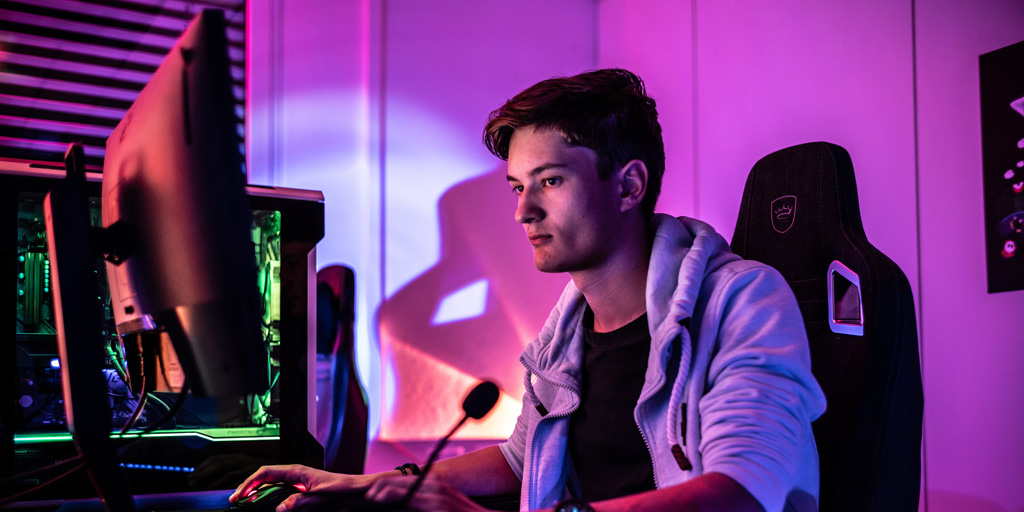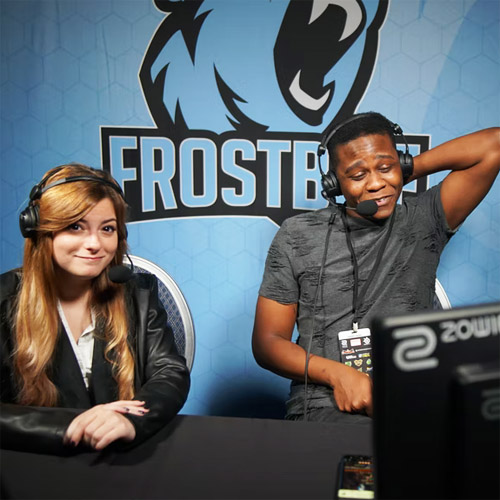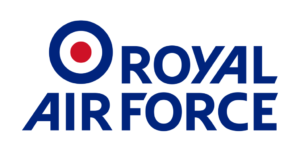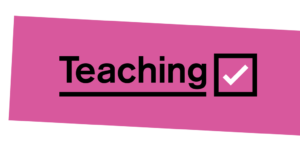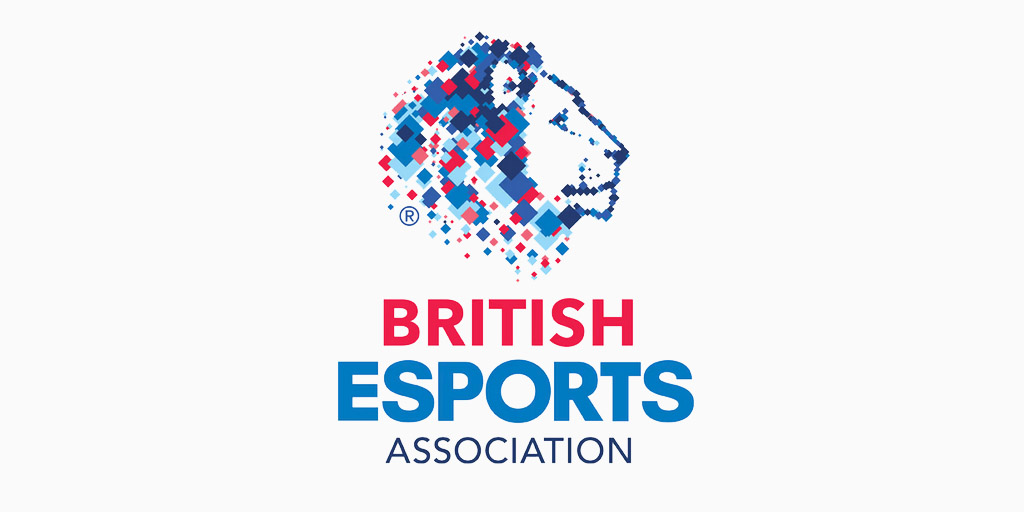Esports Careers Guide - Getting Started In Esports
Want to become an esports champion with your name in the hall of fame? Get started with this esports careers guide for pro gamers, shoutcasters and more!
Pro gamer or all-round pro?
Esports isn’t just about playing video games, although it certainly is centred around it. Almost any career you want to do can be found in the esports industry!
Which esports (team) player are you?
Whether it’s marketing, business admin, law, security, digital or mental health careers that interest you, you can find a role in esports.
A BTEC in esports has something for everyone
Esports is a real career. Let's bust some myths...
Esports is a real career.
Esports is a bigger industry than people think and there is a lot of dedication and hard work. It’s not the same as playing video games in your room, there is so much more that goes into it.
Gamers aren’t antisocial.
While some gamers might be a tad antisocial, it’s just a stigma and it certainly doesn’t come from playing video games. There is so much communication and teamwork in the world of esports, and people can make long lasting friendships with others who live on the other side of the world.
Video games aren’t just for kids.
It’s true that there are video games for kids, but there are hundreds of thousands of games to choose from these days and they aren’t all for children. Esports covers a wide range of games including Fortnite, Call of Duty, League of Legends (LoL) and so many more.
A career in esports is as risky as any other job.
Some people might think esports won’t provide you with a future. Not only is esports an increasingly growing industry, especially in the digital age, but you can have more aspirations in the industry than being a pro player. There are opportunities such as analysts, managers, coaches, journalists, engineers and even nutritionists. You don’t have to have the skills of a pro player to make it in the industry. As long as you have passion, you can do any role you want.
The industry pays as well as any other.
Your income is going to depend on the role you have. As an influencer, it might depend on the size of your fanbase. If you want to be a pro player, it’s going to depend on how many titles and tournaments you have won too. So don’t expect to be paid an extravagant salary as you enter the industry, but don’t think that it won’t be a worthwhile industry to work in either.
Anybody can be a pro gamer (sort of).
Anybody can build their skills to pro gaming level with passion, dedication, and a whole lot of hard work – but it isn’t an easy career that just anybody can excel in straightaway. Becoming a pro gamer includes long, intensive training and practice. It includes tasks such as analysing, strategy, and knowing the games inside out. It takes a lot of hard work to be a pro gamer and is like any other job.
Playing video games isn’t bad for you.
Playing video games can be good for you… with moderation of course. It can boost so many soft and transferable skills such as communication, analysing and reaction times, and your mental health too. However, taking it to pro levels will have similar risks to any other sports to your mental and physical health. This is why pro gamers have a team behind them with nutritionists and fitness regimes to keep healthy.
You can have a worthwhile career in esports.
Some say esports qualifications means you just play video games, and this won’t help you in the future. It is most definitely a myth, and it shouldn’t stop you from considering a career in esports, especially if it’s something you really want to do. Studying esports isn’t going to be all about playing video games. It will include many things you can do in the industry such as coaching, shout casting, marketing, and journalism. Playing video games and pro gaming is only a small part of what you can do. The skills you gain from your experience and qualification will be valuable for any other role you choose to explore.
Careers information from Pearson can help you get started...
Pearson have groundbreaking BTECs in Esports which are a trusted and valuable route into esports careers. Find out more...
Esports career pathways Esports career guide BTEC esports progression mapEsports Career FAQs & Insights
Is there something you’d like to know about esports careers? Maybe we can help!
What types of esports career are there?
There's more to esports than sitting in the gaming chair or performing at esports events. Whether you're into spreading the word or working with the technology, there are countless roles in the big wide world of competitive gaming. Here's just a taste of the careers on offer...
I’m into esports events/people
- Agent
- Coach/analyst
- Event manager
- Finance/accounting manager
- Human resources
- Lawyer/legal executive
- Journalist
- Photographer
- Esports shoutcaster/host
- Social media manager
- Video producer/editor
- Observer
- Admin (referee)
- Esports streamer/influencer
- PR manager
I’m into esports tech
- Cyber security
- Software development
- Data and analytics
- Cloud solutions
- Network engineering
- Mobile technologies
- Digital engineering
- Artificial intelligence (AI)
- Usability design (UI/UX)
- Broadcast/production
- Network management
- Virtual Reality (VR)
- Software engineering
- Web development
What skills do you need for pro gaming careers?
Useful skills for pro gamers (and many other careers, too):
- Teamwork
- Leadership
- Communication
- Strategic thinking
- Problem solving
- Decision making
- Analytical skills
- Cyber/digital skills
- Ability to multitask
- Dexterity
- Improving processing ability and reaction times
- Curiosity and desire to learn
You can’t be a pro gamer forever. It demands incredibly fast reflexes. As with any sport, those reaction times will atrophy or decrease with age. Many pro gamers stay in the industry, though. Their gaming skills and interests serve them well in digital and creative gaming jobs.
How do you get these skills?
You know what they say – practice makes perfect. So does talking to other gamers in your community, researching online, and listening to pearls of wisdom from the best in the biz. Vocational qualifications like BTECs and work experience (yes, even in the world of pro gaming!) can also help you build these skills over time.
Build Your Skills With the FREE Young Professional ProgrammeUseful skills for a range of esports careers
Admin/referee – communication skills, problem solving skills, great understanding of the games rules and tournaments, how to spot cheating
Agent – strong negotiation skills, networking, communication, a knack for building relationships with stakeholders, skilled at selling players they represent, well versed in contract law and legal areas of employment.
Broadcast/production roles – strong technical skills is key, in-game observers need excellent knowledge of chosen game, awareness of technicalities of live broadcast. Technical directors need a creative eye for camera angles, clear communication to provide instruction to camera operators. Producers need planning skills.
Esports coach/analyst – coach needs to be able to grow strengths/skills of players, teamwork, strategic thinking, motivational thinking, discipline. Analysts need to be expert at taking information to provide stats.
Cyber security analyst – great IT skills, understanding of security tech and programs, risk assessment, identifying threats, analysing patterns and trends, communication, time management.
Event manager – be able to liaise with many different teams, be able to come up with new ideas and solutions, initiative, creative thinking, resilience, time management and planning, knowledge of health and safety
Finance/account manager – understanding of finances, business skills and administration, managing and analysing data, effective communication, understanding of tax and other laws.
HR – knowledge or corporate esports organisations, candidates identification and approach strategies, flexible account management, passion, knowledge of workplace policies and health and safety.
Lawyer/legal executive – excellent understanding of law and negotiating skills, analytical and problem solving skills, ability to be professional and discrete, communication.
Journalist – building relationships for close contacts and industry insiders, ability to remain objective, tell both sides of the story, work quickly and meet tight deadlines. Have a good eye for a story.
Photographer – excellent eye for imagery, knowledge of cameras, equipment and lighting, understanding the subject matter, ability to think on your feet and act quickly. Good communication and people skills.
Shoutcaster/host – similar skills to TV presenters or radio hosts. Communication skills, understanding or subject matter, energy, and ability to act quickly.
Social media manager – excellent understanding of gaming community and their interests, includes videos, memes, news, updates etc. good writing, editing and graphic design skills. Ability to be patient, polite, friendly, and understanding.
Video producer/editor – good video editing skills, understanding of editing software like Adobe, Premiere, Sony Vegas and more. Good understanding of camera equipment, lighting etc if producing video. Ability to meet tight deadlines and follow style guidelines.
Web developer – good understanding of website design and development, software engineering, online user interaction etc. technical knowledge in web app frameworks and encryption. Good eye for detail and problem solving skills. May need to be able to write code in programming or scripting languages e.g. PHP or JavaScript.
What Qualifications & Training Do You Need For Esports Careers?
School, College And Training
Pro gaming is a career where your teamwork, strategy, hand-to-eye co-ordination, reflexes and endurance when it comes to practice are more important than your qualifications. However, there are many tasty esports careers where it will help if you are educated at school to GCSE or A Level standard (or the equivalent) and sometimes beyond! It’s important to have basic digital skills, even if you’re on the people/entertainment side of things – like being a shoutcaster. It goes without saying that it helps if you love and respect what goes into pro gaming, whether you’re a data analyst or journalist, because you’ll keep up with both the trends and the technology.
If you’re taking the academic pathway to an esports career, your trajectory from school onwards can look like this (though you can get into the world of work at any time):
Academic pathway:
- Level 2 – GCSEs & Tech Awards
- Level 3 – A Levels Esports
- Level 4 – HNC/HND Level 4 / 5
- Level 5 – HNC/HND Level 4 / 5
- Level 6 – Esports Degree
- Level 7 – Master’s Degree
BTECs
As an alternative to A-Levels, you can do esports BTECs from the age of 16. Like these ones!
- Level 2 – BTEC First/Tech Award in Esports
- Level 3 – BTEC National in Esports
Esports BTECs give you the specialist knowledge and skills to progress into, for example, an apprenticeship or employment.
Esports career pathways Esports career guide BTEC esports progression mapApprenticeships
If you’re a school leaver with GCSEs or S grades (grades 9-4 / A*-C) including English and maths, you could apply for an Apprenticeship and build your skills and knowledge over time. With apprenticeships you will earn a salary, get hands-on training with your employer AND do part-time study towards a qualification that could take you far in your career.
The apprenticeships pathway to an esports career looks like this:
- Apprenticeship L2
- Apprenticeship L3
- Apprenticeship L4
- Apprenticeship L5
Vocational qualifications
As well as BTECs, you can also explore Level 4 Higher National Certificates and Level 5 Higher National Diplomas.
University and graduates
UNBELIEVABLE NEWS – you can do an esports degree at university!
Please excuse the shouting, but this is important. Of course esports is a valid career pathway if you can do a degree in it! You can do an esports degree whether you’ve taken a vocational route with BTECs or an academic route with A-levels or the equivalent. You might also be able to part-study for an esports degree while working, or take a breather from the world of work to head back into the world of learning. You can study for a Level 6 esports degree, then seek employment (perhaps with an esports organisation you’ve already gained work experience with) or move on up to a Level 7 Master’s Degree.
You can also look out for Degree Apprenticeships. Whether it’s the tech angle or events management you’re interested in, degree apprenticeships are a way to study for a cost-free degree while earning a salary working with an employer who gets help from the government to pay for your learning. With degree apprenticeships, you get a debt free degree qualification and everyone wins.
Esports Work Experience and Volunteering
Getting your foot in the door…
Admin/referee – Junior positions are a good way to get your foot in the door. Look for volunteering positions and put yourself forward to get valuable experience. Build your knowledge by reading the rulebook and learning from previous examples of situations in the game. Get to grips with different tournament bracket systems like Battlefy and Challonge. Start small by helping in smaller tournaments and work your way up to build experience. Admin / Referee – British Esports Association
Broadcast/production roles – freelancers are used often. Full time employment within esports can include content writers, multi-skilled studio operators, technical manager, graphic designers, producers. Freelancing opportunities can include camera and sound operators, floor managers, technical directors, lighting technicians, in-game observers, makeup artists. You could start with TV broadcasters who offer work experience placements, apprenticeships and graduate schemes. Caster / Host – British Esports Association
Shoutcaster/host – reach out to tournament providers to pick up experience. The skills of a TV presenter or radio host come in handy, so studying a course in presenting or broadcasting will be helpful to gain experience. Consider being a freelance Shoutcaster/host and employed Shoutcaster/host.
Observer – working at grassroot events for short volunteering opportunities is a good way to get your foot in the door.
Volunteering
The British Esports Association has some great insights on how volunteering can kickstart your esports career. Check it out.
Work experience
Examples of useful work experience to help you take your next steps in esports include…
- work experience involving events, entertainment, IT or gaming
- work experience involving basic digital skills
- attending free or paid courses (face to face or online) relevant to your preferred career
- Work shadowing (even if it’s just for a day)
- Work placements in a company
- Work placements on a college or university course
What Could You Be Doing In An Esports Career?
Agent – an agent will look after a player’s best interests by securing sponsorship details, handling their image, or negotiating better contracts for them. They will represent a player, caster or esports professional by handling paperwork and looking after legal aspects of their career to allow them to focus on what they do best in esports, just like an agent would for players in football or other sport.
Broadcast/production roles – There are many different responsibilities within broadcast and production, from handling creative tasks and technical challenges to project coordination. Without broadcast and production professionals, there would be no matches or streaming.
Coach/analyst – An esports coach will train a team against other teams to help them improve. They work closely with players to motivate them, identify their strengths and weaknesses, and make sure they play at their best. They will need to develop strategies and analyse opponents in order to win as many tournaments as possible. This can include boosting wellbeing and instilling fitness regimes. Roles include head coach, draft coach, strategic coach, and sports psychologist.
Cyber security analyst – Analysts will keep systems running, stop hackers or intruders from obtaining data, and safeguard a system or network. It is a growing field that is vital to esports so that any digital equipment used by teams, players and others in esports is kept safe from outside threats.
Event manager – Event managers ensure esports events are delivered as expected by managing teams, budgets, and timescales. They conduct research on venues and suppliers, booking equipment, hiring contractors and monitoring health and safety.
Finance/accounting manager – These managers track and helm financial activity within a company, keeping an eagle eye on budgets, tax info and audits. They can review finances (which isn’t just about claiming pizza on expenses), suggest changes and ensure finances are where they should be.
Human resources – HR deals with health and safety, workplace policies, employment law, payrolls, holidays, hiring processes and staff procedures on the administrative side. It’s basically about balancing the welfare of players and the work culture and longevity of the organisation. On the management side, HR folk will make sure the company has the right resources, with staff doing the right jobs, and manage performance.
Lawyer/legal executive – Legal eagles provide advice to businesses, help with lawsuits, research cases and legislation and draft legal documents. They may assist with player contracts for other roles, and advise clients on legal practices and operating within the law.
Journalist – Journalists gather and analyse information to create content in the public interest. This includes (but isn’t limited to) podcasts, newspapers, magazines, radio, TV, articles, and streams. Journalists can build up a strong following if they get known for writing esports and gaming news stories, features, analysis articles, opinion pieces, match reports, interview players – all in written or video form. Journalists have the job of hunting down and sharing interesting stories and developments in the industry or in particular games.
Photographer – Photographers capture that key moment and storyline in photos of particular events, activities, or people. Sometimes, pictures can say a thousand words – though nothing beats the atmosphere of actually being at a live esports arena event.
Shoutcaster/host – Hosts and shoutcasters speak over the action to comment on unfolding events. They engage, inform, and entertain viewers. No-one wants a shoutcaster who sounds and feels bored! Hosts and shoutcaster use their expert knowledge of the game to bring it to life for the viewers.
Social media manager – social media managers will look after a community of a particular game or tournament provider. They’ll engage and respond to fans on social media e.g. twitter, facebook, YouTube, reddit, discord, blogs, websites, twitch etc. They’ll update fans of particular teams, esports, and products. Of course, when there’s hate speech or flame wars involved, they know when and how to step in and help make things safe and positive for the social community again.
Video producer/editor – The video producers and editors work on video content. They put together packages or series of content to publish to platforms. An editor will edit pieces of footage together, transition them, add music and sound effects, and record/produce footage. They’ll produce high quality video content with latest updates, vlogs, interviews and first hand announcements.
Web developer – Developers create esports and gaming-related websites, applications, and online products and services. They can produce or manage services on behalf of clients (like keeping a website up to date and evolving it to meet the latest gaming and business needs).
Esports jobs and opportunities - ready for your next steps?
These Youth Friendly Employers offer great opportunities
These Youth-Friendly Employers might be able to help you get great digital jobs, training or experience! Take a look.
Esports careers information for teachers
What are the benefits of esports?
See all Esports Resources for TeachersDigital Career Guides
View job descriptions with average UK salary, useful qualifications and a variety of routes into this career.
Digital Career Guides
View job descriptions with average UK salary, useful qualifications and a variety of routes into this career.
London tech careers are in YOUR reach.
Salary? Jobs? Training? You got it. No experience? No problem. You've got the power. We'll give you the support!
London Digital Jobs and Skills HubSee All Our Youth-Friendly Employers






































































YES! I Want More Free Careers Help...
So what are you waiting for? Grab your future.

